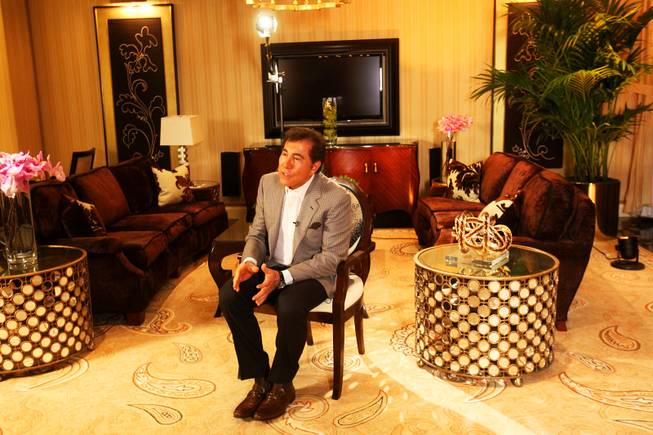
Steve Wynn meets with the media in a villa at Wynn Las Vegas on Wednesday, April 27, 2011.
Sunday, Aug. 14, 2011 | 4:19 p.m.
Sun Archives
One thing is for certain after the latest round of legal wrangling over Steve Wynn’s casino tip-sharing policy: The litigation will continue well into 2012.
Attorneys spent most of Friday afternoon arguing in Clark County District Court about whether state law permits Wynn Resorts Ltd. to require hundreds of dealers at Wynn Las Vegas and Encore to share tips with supervisors.
The judge hearing the dispute, Kenneth Cory, said he may issue a ruling in a month or so — but even then it’s widely known the losing side will appeal to the Nevada Supreme Court.
"Whatever I say is nothing more than a conduit to get to the real answer," Cory said.
The Supreme Court typically takes many months or longer to reach decisions, which is why the Wynn tip issue won’t be resolved until sometime in 2012 at the earliest.
While at least two smaller casinos in Nevada had required the sharing of dealers’ tips with supervisors in the past, Wynn’s policy implemented in September 2006 was the first such effort on the Las Vegas Strip.
The policy is aimed at boosting pay for supervisors who otherwise would earn less than the dealers they supervise. Dealers are typically paid minimum wage or slightly more, with the bulk of their pay coming from tips.
It’s common for workers in the same job classification, waitresses for instance, to pool tips.
Giving supervisors a share of the tips is less common, with Friday’s debate focusing on whether that directly benefits the finances of Wynn and whether those supervisors are in the direct chain of staff responsible for customer satisfaction and presumably tipping levels.
A lawsuit over the Wynn tipping issue has bounced from the District Court to the Nevada Supreme Court to the office of Nevada’s Labor Commissioner.
Michael Tanchek, state labor commissioner at the time, in July 2010 upheld the tip-sharing policy.
A small group of dealers appealed, which is why Cory is now reviewing the issue.
The dealers say that since Wynn is boosting supervisors’ pay with tips earned by the dealers, this is an obvious direct benefit for Wynn and a taking of their money as the company doesn’t have to pay for the raises with its own funds.
"The dealers as a group are losing out here," one of the attorneys for dealers challenging the policy, Leon Greenberg, told Cory. "The result of the policy is to simply enhance the profit and lower the operating costs of the employer."
At issue is some $5 million per year that Greenberg said is being diverted from dealers to their supervisors, costing each dealer about $15,000 per year.
The policy was aimed at boosting the pay of casino supervisors from about $60,000-$65,000 to $85,000-$90,000, or about what the dealers were making before the change, he said.
Wynn had provided the supervisors with a $5,000 raise, with the rest of their raise coming from the dealers’ tip pool, Greenberg said.
Gregory Kamer, attorney for Wynn, tried to shift the focus of Friday’s arguments from Wynn doing something to hurt dealers to Wynn doing what was best for the company.
"This is not a David v. Goliath case," he said. "Corporations are people. The corporation that made this decision consists of 9,000 Wynn employees and 6,000 Encore employees."
He said just 200 or so dealers were involved in the dispute, while "there are 400 dealers at Wynn who did not want any part of this dispute" and 400 more at Encore who operate under the same program and have not complained about it.
While supervisors characterized as "employers" are not allowed to take or share in employees’ tips, it’s clear in this case the casino supervisors are not "employers" as they aren’t involved in hiring and firing, Kamer said.
In fact, the supervisors have substantial customer satisfaction duties and that’s why they’re in the direct chain of staff responsible for customer satisfaction and eligible to share in and receive tips, Kamer said.
This is especially true given a reorganization of Wynn’s casino department in conjunction with the change in the tip policy, he said. Under that change, floor supervisor and pit manager positions were eliminated and these positions were replaced with new Casino Service Team Leader (CSTL) positions.
"Just because you give a tip to one person doesn’t mean others were not responsible for the good service," he said. "They’re part of that service chain."
Kamer urged Cory not to legislate from the bench, noting the Nevada Legislature has repeatedly had the chance to change the law to outlaw tip-sharing arrangements like those at Wynn – but has not done so.
Cory commented during the hearing that there appeared to be a lack of case law that would directly guide his decision and he questioned attorneys repeatedly about whether Tanchek had improperly refused to consider some evidence.
"Aren’t I bound by what the labor commissioner says, unless he contravenes the law – or there’s a lack of substantial evidence in the record?" the judge asked.
But he told Greenberg: "I can see you advancing an argument that as long as it really affects directly the bottom line of the casino -- that is they get to supplement the salary of CSTLs with money they take from dealers -- that’s certainly a direct benefit."

Join the Discussion:
Check this out for a full explanation of our conversion to the LiveFyre commenting system and instructions on how to sign up for an account.
Full comments policy